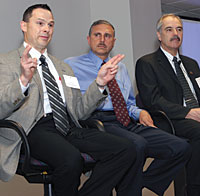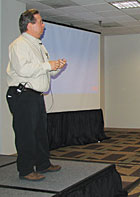
"It's good to see this," said Mach. "This should only get bigger and bigger."
In addition to an opening reception with tabletop exhibits, there were breakout sessions, hands-on technical roundtables, and complimentary Industry Competency Exam (ICE), RSES, and North American Technician Excellence (NATE) exams for instructors, administrators, and program advisory committee members from secondary and postsecondary programs, private career schools, and apprentice programs from across the country.
Issues discussed in the classroom settings covered a broad range of topics, including "Student Motivation," "Leaping Over the Language Barrier," "Water Heater Technology," "The New Era of A/C-SEER 13," "Solderless Pipe Connecting Technology," "Increasing Student Populations," and "Quality Contractor & Quality Installations."
"I think this is good for the industry," commented instructor Jim Bergmann of Cuyahoga Valley Career Center (Cleveland) while on the shuttle bus back to the airport.
PANEL DISCUSSION
At the opening general session, attendees got the opportunity to ask industry-related questions to a panel of representatives from each of the participating associations.Representing ARI was Scott Boxer, president and chief operating officer of Service Experts and chairman of the board of trustees for NATE. Representing ACCA was Ray Isaac, president of Isaac Heating and Air Conditioning in Rochester, N.Y., who serves on ACCA's executive committee as the association's secretary. Representing RSES was Ron McCarthy, the association's international president and product development and training manager at Kerr Controls Limited, a wholesaler in Atlantic, Canada. Representing PHCC was Jo Rae Wagner, president-elect of PHCC and president of CTO, a commercial mechanical contracting business in Harlingen, Texas.
During the 90-minute session, panel members gave their opinions regarding various topics, including what owners look for when they go to hire program graduates. The general consensus of the panelists was that attitude is the greatest asset contractors and business owners see coming along with students joining the workforce. However, it felt many, if not most, graduates still lacked strong math skills.
"We still have to teach them that," said Isaac. "I guess that comes back to our educational system, not necessarily just you."
Each member of the panel agreed that more needs to be done to get young people interested in the industry. Many noted that they are not getting any help from guidance counselors. Several from the crowd asked that each association involved in the workshop provide material to introduce to grade school, as well as high school, students.
"I think we have to reach the grade school-aged kids first," expressed one teacher from the crowd. "That's when they begin getting interested in things. This is the time we need to get them interested in the trade. I think when they are in high school, it is too late."
Each panel member agreed that contractors and wholesalers should get more involved with the education community. Some of the suggestions from the crowd included participating in local program advisory councils and/or speaking at career days at local schools.
"We are all in this together," stated one teacher in the audience. "We cannot do this all by ourselves."

STUDENT MOTIVATION
Kirk Alter, associate professor in Purdue University's Department of Building Construction and Management, supplied a thought-provoking session on student motivation."[Teaching] is a passion," said Alter. "You don't do this for the money. You don't do it for the glory. You don't do this for the fame. You do it because you love doing it. And that's why all of you do it. And you ought to be applauded for that. It is a thankless job."
The former mechanical contractor owner encouraged the packed room to get more involved with students. "One of the questions we need to be able to answer for our students every night is: ‘What is in it for them?' " said Alter, who has been active in the mechanical construction industry since 1974.
"Do you think we do enough of that as teachers?" After a few seconds of silence, he answered his own question by saying, "No."
The goal of every teacher, he said, is to keep students motivated.
"In your classrooms, there are plenty of people who want to learn," said Alter, who also said he had no problem in telling a student to leave his classroom if the student was not paying attention.
"That's what we mean when we say that all learning is 100 percent voluntary, 100 percent of the time. If a student does not want to be here and I can't engage him, eventually he or she has to leave."
Alter supplied his "Ten Commandments" for bringing about student motivation. His first directive for teachers was: "Be S.T.E.W." In this case, "S" stands for social, "T" stands for technical, "E" stands for enthusiastic, and "W" stands for winner.
"Educating reluctant learners requires 100 percent enthusiasm, 100 percent of the time," he admitted. "Whose fault is it if they don't learn? We must tangibly and quantifiably measure the results of our work. If anything is found to be lacking, we need to either correct it or eject it."
His second commandment: Teach well. "We have to relearn how to learn," said Alter. "They are not lazy or stupid. You just haven't found out what makes them tick. It's easy to cover the material, but you have to ask yourself, ‘What did they learn?' "
His other commandments are:
3. "Reach them where they are." In this case, Alter suggested instructors try podcasting, blogging, or e-mailing, as "this is their environment."
4. "Evaluate, assess, and then modify. Then repeat." In other words, always keep evaluating what is working, and what is not, he suggested.
5. "Practice good classroom management." As he put it, "You can't demand respect, but you can command it."
6. "Ask good questions."
7. "Read, learn ... respect."
8. "Practice peer review and continuous improvement."
9. "Practice servant leadership." In other words, the teacher must serve the student. "That's why you are there," he said. "You are there to provide answers."
10. "Have fun." As Alter put it, "You have to have this. If you dislike your students, you may as well find a new profession."

SEEKING STUDENTS, IDEAS
In another classroom, a panel of instructors held a brainstorming session with attendees. The task was to find more ways to increase student enrollment. In addition to Dick Shaw, former program director and professor emeritus of the HVACR program at Ferris State University (Big Rapids, Mich.), other panel members were Rob Bates, instructor at Delaware Technical and Community College (Georgetown, Del.), and Bob Feathers, a trainer for Emerson Climate Technologies (Sidney, Ohio)."I don't want this to become a bitch session on what our guys are getting paid," cautioned Bates.
"We can complain all day long on that. Yes, we all want them [graduating students] to be paid more. We think they deserve more. Heck, we think we deserve more. But we're not going to recruit students if we purely tell them how much money they are going to make."
In the end, in order to get more students in the classroom, the general consensus was for teachers to get more participation from area contractors.
"You need to get them [advisory council] to do something for you," stressed Bates. "Don't just have them come to your place twice a year and go. With their help, good curriculum could be developed. They can spread the good word of your programs. Get them working with you."
Another top recruiting suggestion, as voted by attendees, was to go to alumni or students for help in getting more students registered.
"Show that shining apple that you have," said Shaw, adding that "students recruit students."
Other suggestions included going to high school counselors, placing strategic signage in the community, going to minorities, using direct marketing, and participating in job fairs.
On the closing day of the event, the workshop held an open "I've Got an Idea" session. Here instructors were awarded money for providing helpful hints and teaching tips to fellow educators and advisory committee members. Facilitator Greg Goater, of Isaac Heating and Air Conditioning, was more than happy to give at least one $20 bill to each instructor who came up to the microphone to share his/her idea that worked.
Before class was dismissed, Pitt Community College (Winterville, N.C.) instructor Billy Mozingo was presented a plaque for being named "2005 Instructor of the Year" by The NEWS and ARI. Also receiving plaques for earning Partnership for Air-Conditioning, Heating, and Refrigeration Accreditation (PAHRA) were Illinois Central College (Peoria, Ill.), Blackhawk Technical College (Janesville, Wis.), and Grand Rapids Community College (Grand Rapids, Mich.).
Publication date: 05/01/2006



